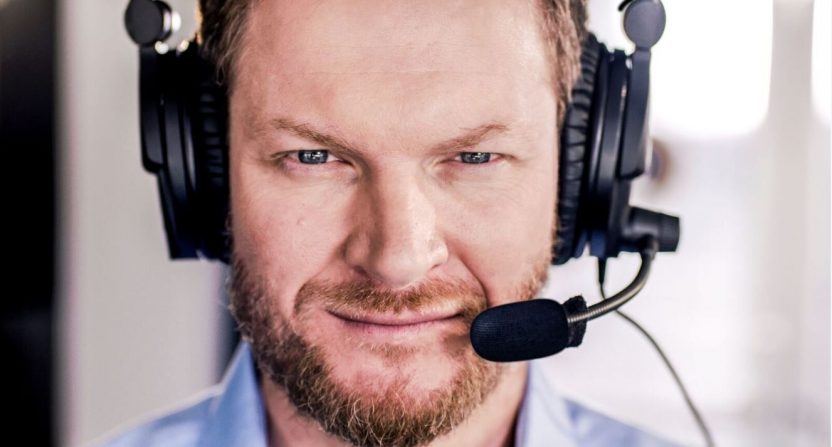Dale Earnhardt Jr. has been the new face of NBC’s NASCAR broadcasts for 2018. The 15-time Most Popular Driver stepped aside from racing last year due to concussions and embarked on the next chapter of his career. Earnhardt hasn’t set racing completely aside. In fact, he raced at an Richmond Xfinity Series race a few weeks ago and finished fourth. But racing has taken a back seat to being a husband, father, and an analyst for the second half of the NASCAR season for NBC.
I had concerns about a potential four-man booth when NBC first announced Earnhardt’s hire, but NBC seems to have that easily figured out as they have shifted the four into different roles and setups each week. Along with play-by-play commentator Rick Allen and analysts Jeff Burton and Steve Letarte, the booth setup may be split into two booths with two people in each booth one week. The next week, one or two of them may be down in NBC’s pit box on pit road while the others are up in the booth. On weekends like at Watkins Glen and Indianapolis, NBC utilized a “Radio Style” broadcast where each person, along with MRN’s Mike Bagley, took a section of the track and did play-by-play when the leaders drove by them. While the constant shifting of roles may be a lot for someone new like Earnhardt, he’s rolled with the punches and it should make him better in the long run.
The first thing you’ll notice about Dale Earnhardt Jr.’s broadcasting style is his enthusiasm. Our first taste of his enthusiasm came in his first race with NBC, where at the end of a tight Chicagoland race, featuring the Kyle’s Busch and Larson, we learned of the term “slide job.”
There are two ways to view this in terms of the broadcast. Some may have loved Earnhardt’s natural enthusiasm and felt he reacted appropriately when seeing an exciting finish. Others may have seen that and would’ve hoped Earnhardt kept his emotions in check so he didn’t make the finish about himself.
What Earnhardt did here was great but it’s important to understand why he was great here. It would be very easy to make the broadcast about yourself but Earnhardt didn’t do that. For the most part, he didn’t step on what Rick Allen was saying and let Allen call the race, inserted his own contributions, and created a viral moment that enhanced the broadcast. While this was their first race of the season, it felt like they had been broadcasting together for years.
Maybe it’s because he’s new to broadcasting but Earnhardt still has this enthusiasm that permeates through the screen. He’s not hamming it up for the cameras. He just likes what he sees and it comes out like that. If he’s doing this in ten years, that might fade away, but as long as Earnhardt’s reactions are natural, it works.
There have been some issues with Earnhardt’s broadcasting, mainly timing and transition issues. This is really apparent during Radio Style broadcasts. It just seems that Earnhardt sometimes overthinks the situation and knows in the back of his mind he has a set time to say what he has to say and then get out for the next person. While it’s something to improve on, this isn’t a big deal knowing that Earnhardt will improve this over time. Radio Style broadcasts are like improv and it takes some time to get used to that. As long as Earnhardt keeps it simple and plays off of those around him, he’s going to improve.
Awful Announcing spoke with Dale Earnhardt Jr. over the phone. Over our conversation, we discussed how Earnhardt prepares for each race, his favorite announcers, and his new book, Racing to the Finish, which comes out Tuesday October 16. You can see Dale Earnhardt Jr. in the broadcast booth as NBC Sports presents Monster Energy NASCAR Cup Series racing from Talladega Superspeedway this Sunday, Oct. 14 at 2 p.m. ET on NBC as well as every Wednesday on NASCAR America at 5 p.m. ET on NBCSN.
(NOTE: Interview has been edited for clarity)
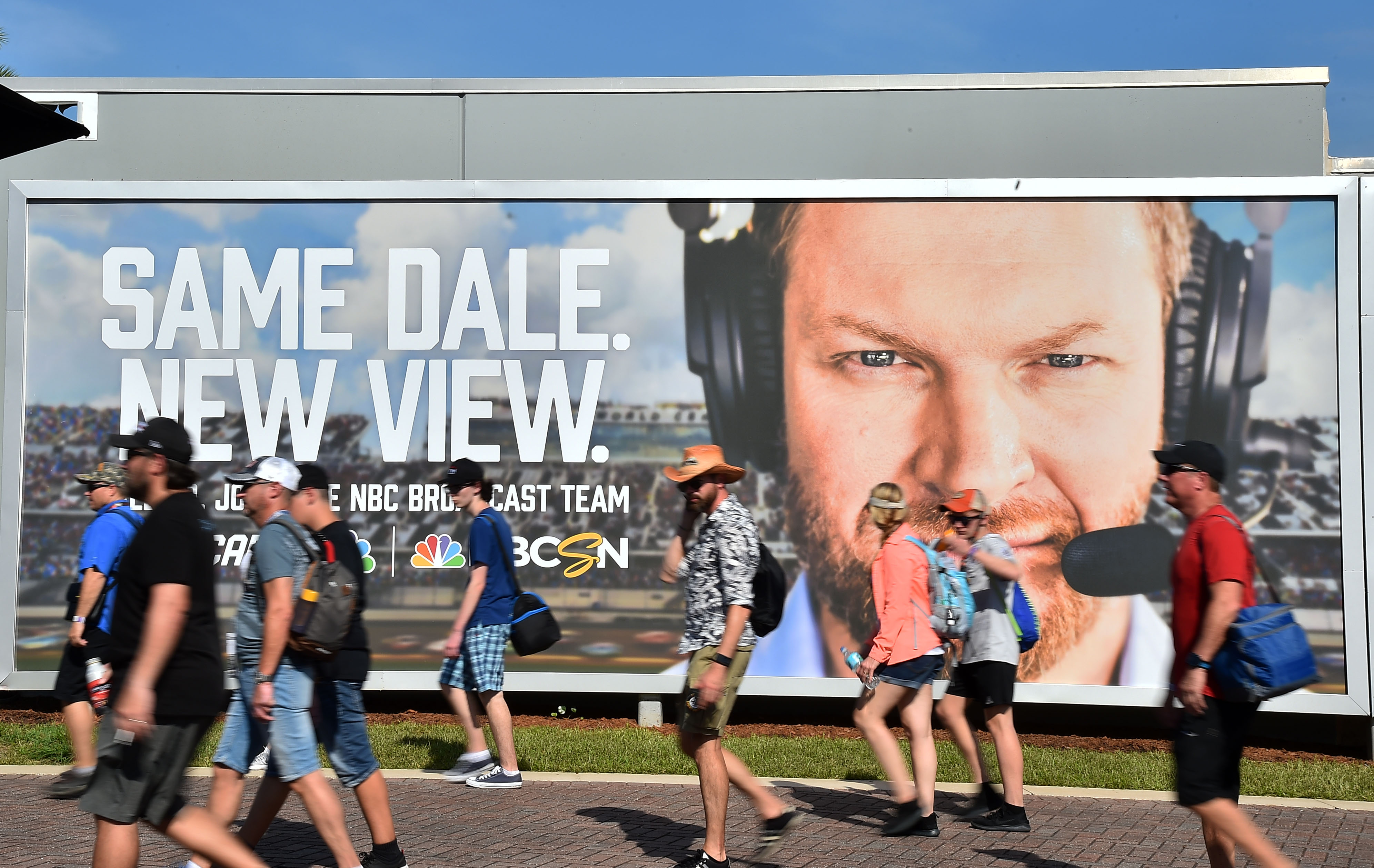
Phillip Bupp: What got you into broadcasting?
Dale Earnhardt Jr.: Well, I didn’t know what I was going to do when I quit driving cars. I didn’t know what kind of living I would make or what options were out there for me. I eventually, when I got hurt in 2016, I got the chance to get in the broadcast booth and I really enjoyed that. I don’t know that you can know for sure how good of a broadcaster you’re going to be if you have no experience. A lot of the broadcasters that came up through, into our sport, were on the radio, or they had some kind of background to help them hone their craft. And, to come right out of the car and jump into the booth, you just don’t know whether you’re going to be good, or terrible, or what.
And so, I wasn’t banking on, I don’t even know if I hoped that I could be a broadcaster. I’ve never even thought about it, but when I got hurt in 2016, I got the chance to go in the booth twice. I went in there in Martinsville and at Talladega, and those little experiences were just incredible. I walked out of the booth each time thinking “Man, if this is something that I’m good at and somebody wants to hire me to do, I had a lot of fun doing it and I think I would enjoy doing this every weekend long-term.” And so, we started getting some interest from the networks and had some long long conversations with NBC and Sam Flood (Executive Producer and President of Production at NBC and NBCSN). And the more we talked, the more comfortable I got with the idea of pursuing it and taking it seriously, and jumping in with both feet. So, that’s kind of how it all happened. And, I just I feel like it’s maybe a one in a thousand shot for a driver to come out of the booth and be good, and I feel lucky.
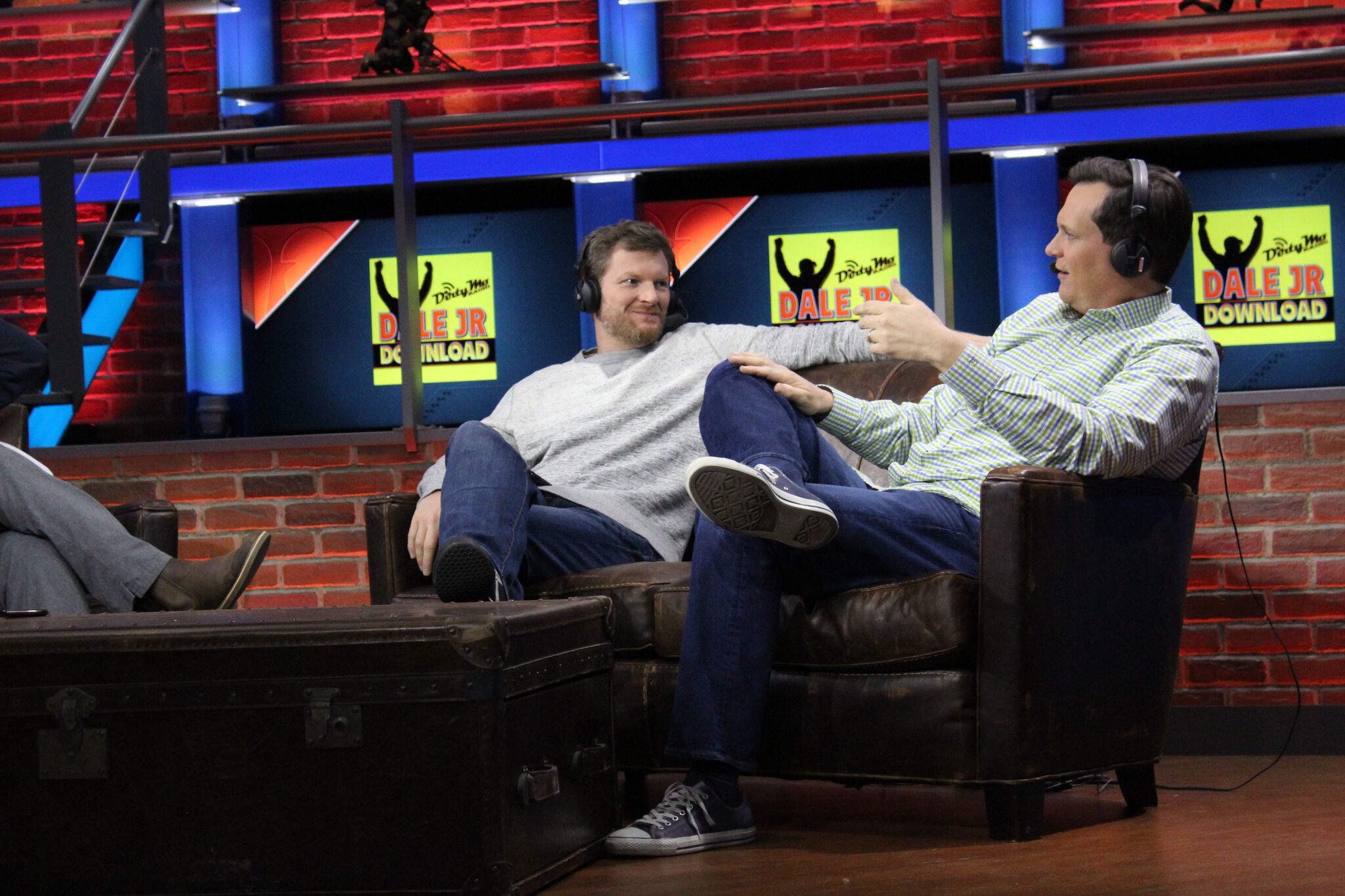
PB: What is your process when it comes to working a race weekend? What kind of research? Who do you talk to in the garage, etc.?
Earnhardt: Yeah, usually with what we have going on during the weekends, it’s hard to get down into the garage physically, but the drivers like to see you down there. And so, you try to get down there as much as you can. But the drivers like to see you and know that you’re a “boots on the ground” kind of guy. So, I think it’s important for me to always push myself to take time to get in the garage whenever I can. It’s been pretty difficult for me this year, but I think as I go further into this deal that it’ll get a little easier. But, there’s just so much going on and you get a little bit of time to grab a bite to eat and then you’re back in the booth doing something. But, we have a fine staff and a group of folks with a company called Racing Insights that feed us a ton of information. We have a lot of journalists and reporters that work with NBC that feed us a ton of information.
So, just about every day I’ve got a full inbox of notes, and information, and comments on drivers. It’s just coming at a rapid pace, and I read through all of that information, print what I want, make physical notes of some of the stuff that stands out to me, and I try to take that into the weekend as the base of information and content that I have. So, we’ll start having meetings and discussions as a group, and through those meetings and discussions even more content starts to come to mind, more ideas, more things that you want to talk about, want to know about, more questions you might want to ask the driver. And, if you can’t get down there on the garage to talk to them, you can text them pretty easily, and they’re all mostly willing to communicate with you. Some of the drivers aren’t as easy to get to communicate, but most of them are.
And, it’s, yeah, so just as the weekend goes, I just take notes, physical notes all the time trying to … Even if it’s something that I really don’t need to write down, I think writing it puts it in memory for me, that kind of helps me put stuff in memory, is by physically writing it down. I’m not very good at reading over things to memorize, it’s better for me to write it out. So, I do, I’m writing all weekend trying to build my ideas and thoughts about what I think we’re going to be seeing and talking about.
https://youtu.be/_DXKVytO1So?t=664
PB: Which commentators and analysts were some of your favorites, both in NASCAR and in other sports?
Earnhardt: Well, obviously I mean John Madden was somebody that I thought was amazing and his appeal to the everyman was something that I really thought was great. He didn’t come across as someone that seemed to be talking down to you. He was a guy that maybe you were sitting across from the bar with, watching the game with. And so, that made it a lot of fun to listen to him. He was always animated, energetic, empathizing, and he had his little “booms,” and “pows,” and all that stuff that was fun, he made it fun to listen. And so, that was somebody that I always liked.
In racing, Ken Squier was amazing, he’s such a wordsmith, just a real incredible guy describing things and making things feel special, making an event feel bigger than it is, making you feel like you were seeing something incredible. I thought Barney Hall, he was a radio guy, his sounds, his tone, he was so easy to hear almost like a song or music. He just had this real amazing delivery and cadence that I was pretty impressed with.
PB: With people like Madden and Squier, it felt like you knew you were witnessing a big event when those guys were calling that event.
Earnhardt: Yeah. That’s what its like when we have Mike Tirico come to our races and sort of lead off the start of the show. It’s like when Mike’s there, it makes people think “Wow, okay this is something I need to watch, because they’ve brought in Mike,” you know? His presence raises the profile of the event. And so, Mike Tirico’s another guy that’s pretty incredible.
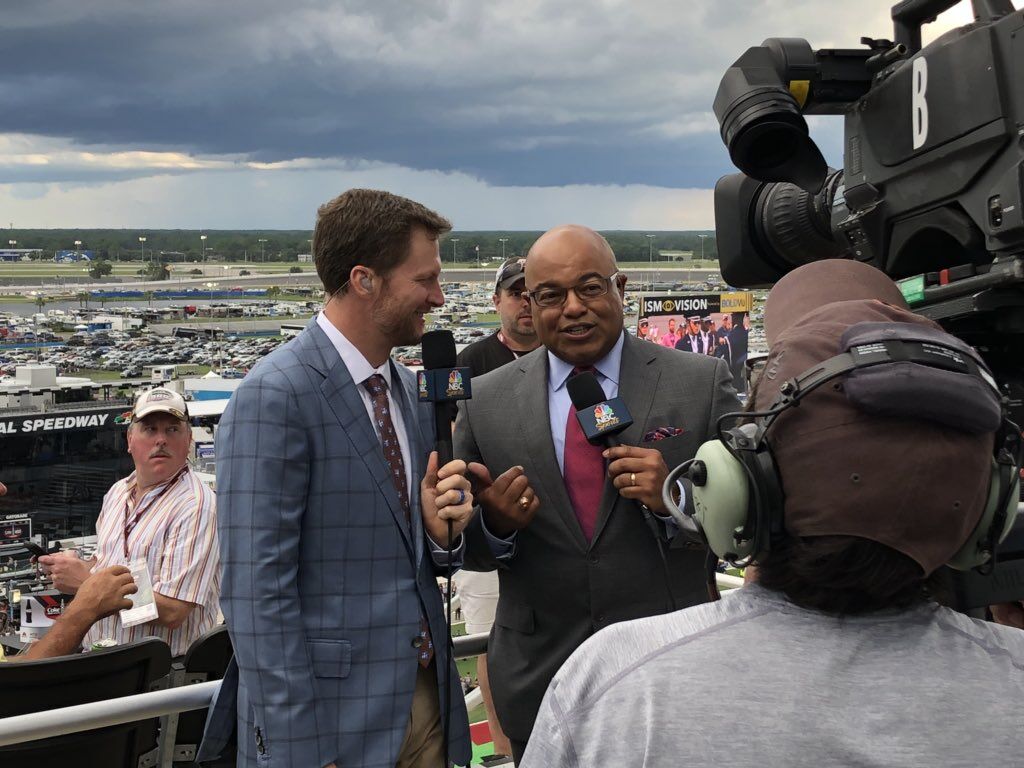
PB: Now, for your first year NBC has already put you in a variety of roles, I call something like “broadcasting boot camp.” And, you’ve pretty much done everything except maybe pit reporting. Do you feel like being put in a variety of roles has helped you become better at your job?
Earnhardt: It has its advantages and it has its disadvantages. I think it’s helped me gain a lot of confidence very fast. It certainly, it sped up the learning process for me I believe to see the different roles that people have, and responsibilities people have, and to do things differently each week, it keeps you on your toes. It also, it’s hard to get into a rhythm. It’s hard when you do a booth broadcast, say if I’m in the booth with Jeff Burton like I was in Charlotte. We have a really good booth, we have a really great day. We leave there really proud of what we did. I feel like that if I did that again the next weekend I could have a good chance of replicating that energy and teeing off on those positives. But, when we don’t do that for another four weeks, and I do all these other things, and I’m in a different position it’s hard to remember what worked and what didn’t.
And, every time you go, even though you may have done a booth with Burton before, every time you go in there and do it it feels like it’s the first time all over again. So, I don’t know if that’s a drawback necessarily or not. ‘Cause at the same time if you’re doing the same thing all the time you might get into some bad habits or you might get a little lackluster, or whatever. It’s hard to keep the energy up when you keep doing the same thing week after week. But, I don’t mind the style of switching up so much because it just keeps us on our toes and I’m learning so much so quickly. I think it’s just going to help me down the road, at least I hope so.
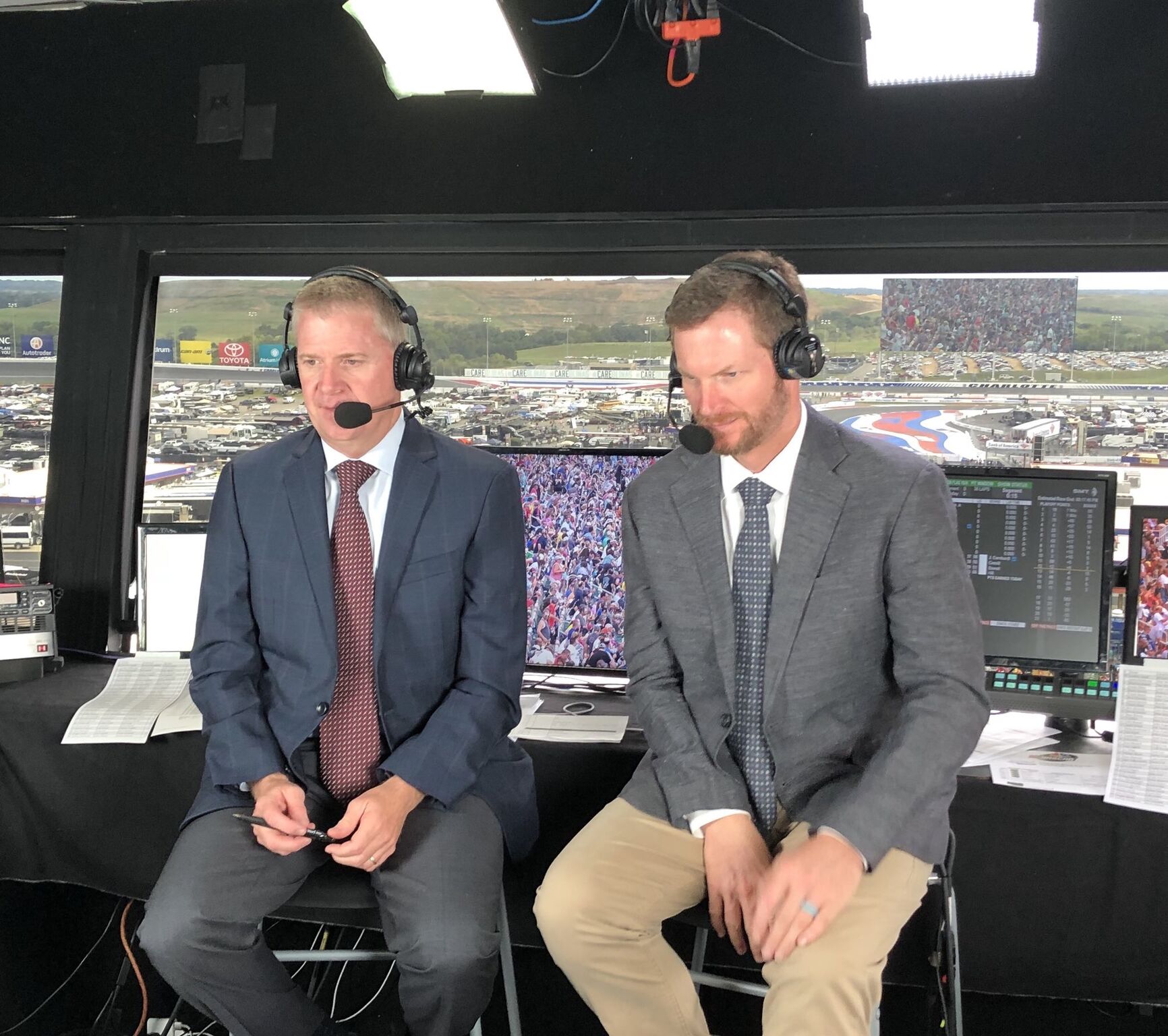
PB: Is there one particular role that you do that you like to do more than the others?
Earnhardt: Well, I really love being in the booth whether I’m with all three of the guys, Rick, Steve, and Jeff Burton, or if I’m with any one of them paired up. I just love being in the booth, talking about the cars going around the track. There’s a lot of times when we break off to a story, or we go down to pit road for some information. There’s so many other things happening in the race that has to get done and have to be done, so there’s only a small percentage of us actually calling pure action.
And so, but when we are for example this past weekend at the Roval, there was a moment where Brad Keselowski and Kyle Larson were battling for the lead, and me and Jeff Burton were calling that action. For me in that moment, that’s as good as it gets. That’s as enjoyable as I’ve experienced when the drivers are having a great battle and we’re just talking about it, and reacting to it. The harder stuff that we do, the show open when we’re all, when we’re in our jackets on TV, that stuff to me is not as much fun. It’s a little, it’s more staged and rehearsed, and it’s a little more prepared, it’s not really reaction. It’s just here’s what we’re looking at today, what we think might happen. And, that’s, it’s a challenge and I enjoy the challenge of it, but it’s not as fun as talking about the race.
PB: What would you say is the best piece of advice someone has given you when it comes to broadcasting?
Earnhardt: It’s never as bad as you think it is and it’s never as good as it felt. So, when I think I’ve done a terrible job. I can go back and watch it and go, “Well, I really don’t know that the public saw the mistakes that I know I made.” And so, I don’t have to beat myself up so much because a lot of people aren’t going to recognize some of the missteps. And then, when we have a great show on the other side of the coin, when we have an awesome show you’ll go back and watch it and go, “Well, the public might not realize why we thought it was so awesome and it might just seem like a good broadcast.” It’s nothing to really win an award for, but it felt amazing for some reason or another, or it felt like you hit a home run. You’ll go back and watch it and then maybe it didn’t come across the screen that way.
So, in a good way that’s a good thing. So, when I feel like I’ve tanked or I’ve made some errors or missteps, I go back and watch it, it really isn’t as bad as I thought. So, that’s probably the best advice. ‘Cause if a person like me, it might not matter to other people that do this job, there may be better advice, but for me, I’m one that would dwell on the mistakes and spend too much time worrying about them. So, that’s good advice, not to really worry about it, it’s never as bad as you felt.
PB: I’m with you there when it comes to being your own worst critic.
Earnhardt: Right.
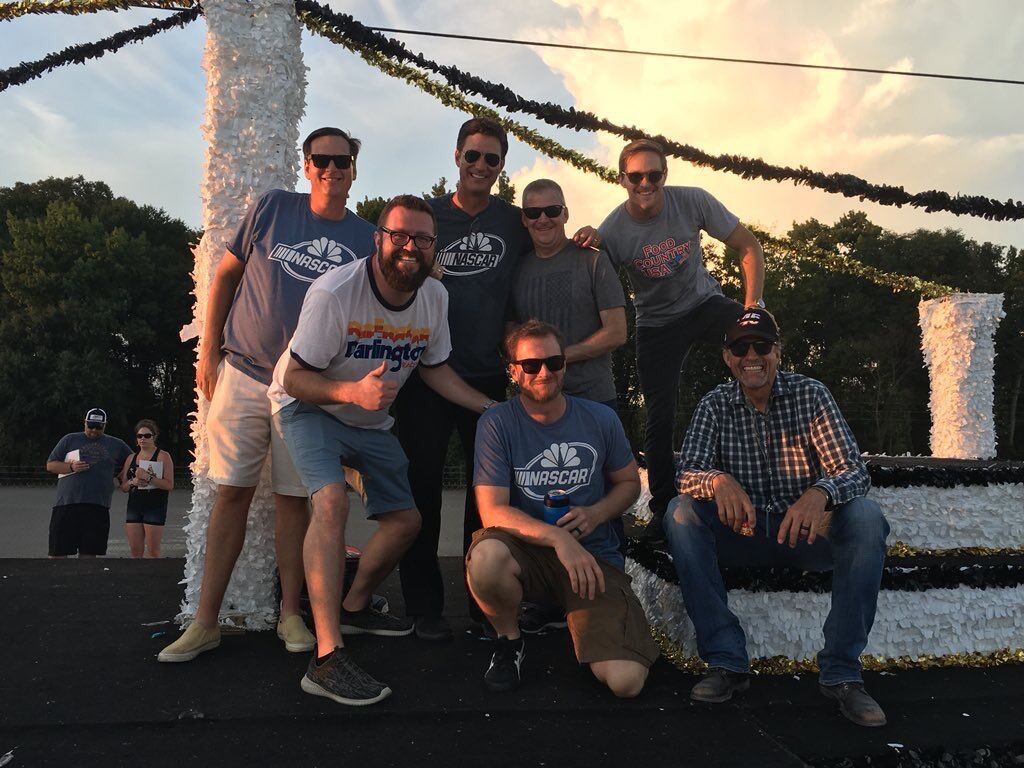
PB: Now, switching topics. I know you have a book coming out that details your recent life and in particular dealing with concussions from racing. I’m interested in the book because while I was never diagnosed, I suffered two head injuries playing sports when I was a kid, and they were likely concussions. And though it’s rare, it sometimes affects me today and those happened 20 years ago. What would be the one thing that you most want readers to get from reading your book?
Earnhardt: I think the one thing that if there’s one thing that I have to pick it’s that somebody reads the book and then calls Micky Collins, my doctor, and goes to Pittsburgh, and gets help for an issue that they’ve been dealing with. So, I’m excited to tell my story. I’m excited for people to hear it. I’m excited for my fans to have some more information as to why I retired. I’m excited to educate people about concussions; maybe they don’t know much about them. I’m excited to help people who have family members, friends, or whatnot dealing with concussions. I’m excited to help them have some passion, empathy, and upstanding.
But, the number one thing really is to sort of help direct people in the right way to get help, and that’s with Micky and team at Pittsburgh. Every time that we tell our story whether it’s for an article, or interview, or video, or whatever, and a tweet, or whatever somebody reads it and they go get help, that gets back to you, that’s just a great feeling. And, Micky tells me all the time that he has people coming into his office on the weekly, that are there because they saw my story and that’s pointed them to reach out to get help. So, mostly, most of the time people get injured and they go see a doctor, but they struggle to find the right treatment. And for whatever reason the story that I keep hearing over, and over, and over is, “Well I saw X amount of doctors and nothing’s worked.” And, I and people start to assume that that means that this is just going to be the way the rest of their life is, that this is how they have to live for the rest of their lives. And, they just accept whatever symptoms those are to be there for the rest of their life and they don’t have to.
So, Micky tells me all the time that we’re always, we’re steering people that way, and that’s really what I want the book to do. And, he’s a part of it, he’s on board with it, he’s added a lot to the book, physically added a lot of his feedback to the book, within the book. And so, to have him connected to it, supporting it, really adds a lot of credibility to the book, and I hope that it helps people understand that they can reach out to Micky and get the help they need.
PB: And, I think it’s important that you’re so open with this because a lot of people can more better understand it and knowing that you’re going through it and trying to cope they can too. And also, I mean their family members who maybe never had a concussion, they don’t know what it’s like, might be able to understand it better.
Earnhardt: Absolutely, that’s very frustrating for a patient or someone who’s suffering is to try to explain to their family members who have never experienced it, to try to explain to them what this is like, what they’re dealing with on a daily basis. It’s so frustrating because you really hardly ever can find the words to describe it and maybe this’ll help, I don’t know, that’s always going to be a little bit of a battle I think. But, I don’t mind sharing now that I’m not a driver. When I was a driver it was hard to be completely open because I still wanted to race, and I didn’t want to be labeled, and I didn’t want to be looked at differently. But, once I got done driving I had no reason not to tell the story, and nothing, I don’t see what negative repercussions there could be from sharing that.
PB: Well, thank you for talking with us. Personally, I think you’re doing a great job. I mean the only thing I would say is, maybe there are some timing things, but you’re going to learn that and pick up on the more you do. That’s more repetition. I love the emotion, it’s natural, it just comes to you. It’s not forced. So, keep on doing that.
Earnhardt: Thank you, yeah, I appreciate it. Yeah, I feel you on the timing and there’s times I feel it and I sense it when I’m not where I need to be and not doing it the way I need to be doing it. And, yeah hopefully repetition and practice makes perfect. Hopefully repetition helps me and I figure that out. That’ll I think determine how long I get to do it.
[Photo credit: NBC Sports Group]

